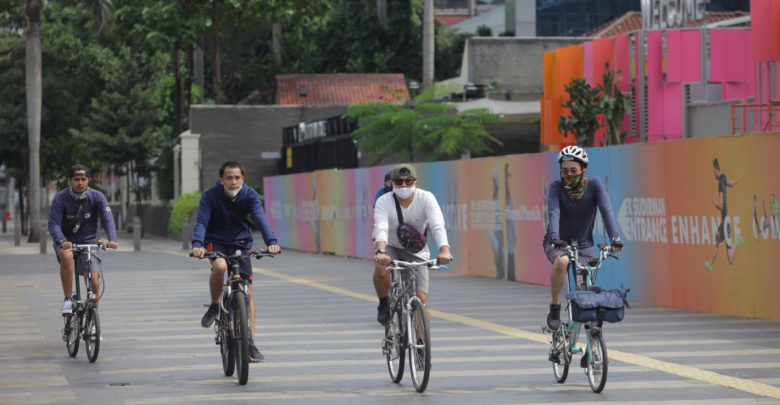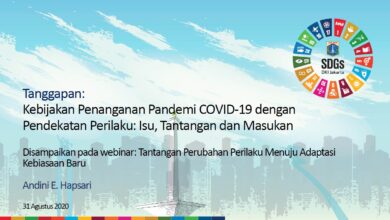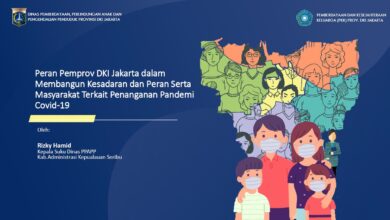
Staying at home for months has inevitably fueled anxiety and boredom among many people, who then struggle to cope with the impacts of the COVID-19 pandemic on their mental health in a variety of ways.
While some people have found a quick fix through virtual connections with loved ones, others have found it through a personal respite: cycling.
Elsa Restriana, who lives in Cikini, Central Jakarta, was no longer able to rely on app-based ojek (motorcycle taxis) to buy groceries after Jakarta banned ojek drivers from transporting passengers under the large-scale social restrictions (PSBB). She had to borrow a rarely used bicycle from a friend who lives next door in the same rooming house weeks ago.
And now her weekly shopping routine has turned into stress relief from self-isolation.
“At first, I cycled only to collect supplies. But, when I realized the longer I stayed at home, the more stressful I was, I decided to continue pedaling around Cikini,” she said on Monday. “I feel happier now.”
The 31-year-old civil servant always wears a mask, brings hand sanitizer and avoids crowds during each ride.
Normally jam-packed, Jakarta’s roads are now mostly empty of vehicles, which makes it more comfortable for cyclists in the city. Jakarta plans to mainstream cycling in daily life but critics say a lack of supporting facilities means that this remains only a plan.
Amid the uncertain future of mass transportation in the city during the so-called “new normal”, Elsa is determined to continue her new habit and commute 5 kilometers to her office in Medan Merdeka by bike even after the pandemic is over.
“As I might return to the office very soon, I would try to bike to work as it is fun and healthier,” she said. “This helps reduce air pollution as well.”
Read also: Commuter line keeps physical distancing measure during COVID-19 ‘new normal’
Fitra Andika, 33, who lives in Gambir, Central Jakarta, found commuting to work by bike during the pandemic faster and safer than relying on the Transjakarta buses he used to ride before the COVID-19 outbreak hit Indonesia. Transjakarta has reduced its service during the pandemic.
Fitra is among thousands of Jakarta workers who have had to work from the office during the outbreak. His employer is implementing temporary work shifts to prevent contagion.
The city administration recorded on Wednesday about 185,000 workers who were working remotely, while 884,000 others were working shorter hours in their offices.
“Now, it is more comfortable to bike to work given the less-crowded streets and better air quality,” said Fitra who started to ride his long-unused bike to work two weeks after the city administration imposed mobility restrictions in mid-March.
He now also cycles to buy groceries.
With offices expected to open soon under the new normal scheme, transportation expert Djoko Setijowarno recommended people cycle to work to avoid possible crowds when using public transit.
He said the Jakarta administration should provide more bike racks and bike-repair facilities to anticipate an increase in the number of bike commuters.
The city administration initially planned to expand the bike lane network to 63 km this year out of the planned 500 km throughout the city. However, this year’s program is likely to be scrapped as Jakarta reallocates the city budget in response to COVID-19.
For Wegit Triantoro, a 27-year-old employee of a private company, who regularly cycled once a week before the outbreak, exercising at home with the help of a workout app was no longer fun.
“Just when exercising at home failed me, cycling provided a new way of easing [mental] exhaustion,” said Wegit who lives in Jatinegara, East Jakarta.
Outside Jakarta, people in other regions where social restrictions have been imposed have also turned to cycling to beat cabin fever.
“As I ride my bike once a week to buy daily needs, I feel like cycling is more of a self-reward. Let alone the fact that the scenery on my cycling route here is so beautiful, so I am always excited about cycling on Sunday,” Mahmudi, 24, a resident of Barito Kuala regency in South Kalimantan said.
South Kalimantan is the province third hardest-hit by COVID-19 outside of Java Island, with 969 confirmed cases having been recorded as of Wednesday.
Artikel ini telah tayang di thejakartapost.com dengan judul “Urbanites turn to bike riding to beat cabin fever”, https://www.thejakartapost.com/news/2020/06/03/urbanites-turn-to-bike-riding-to-beat-cabin-fever.html
Penulis/Editor : Sausan Atika – The Jakarta Post
Foto Cover : People wearing masks ride bicycles while keeping social distance on Jl. Jenderal Sudirman in Jakarta on Sunday. The government and businesses are gearing up to gradually reopen the economy under health protocols to establish a so-called ‘new normal’ amid the continued rise of confirmed COVID-19 cases in Indonesia. (Antara/Reno Esnir)



